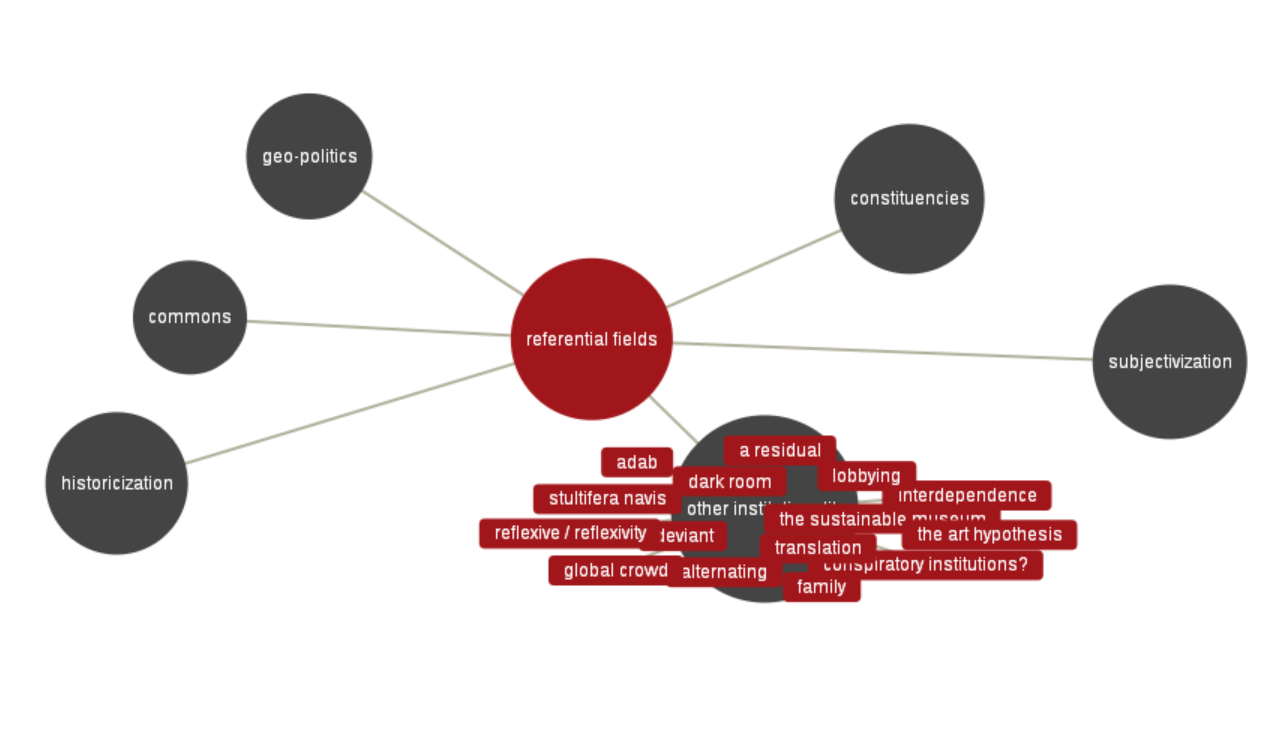Glossary of Common Knowledge (2017)
Filed under book | Tags: · art theory, commons, contemporary art, geopolitics, glossary, history, politics, subjectivation, subjectivity, theory

The Glossary of Common Knowledge is a research project by MG+MSUM, Ljubljana, in the frame of L’Internationale, aiming to negotiate various positions, contexts and local narratives about contemporary art. The glossary entries were produced through six seminars (2014-17), each focusing on one selected referential field: historicization, subjectivization, geo-politics, other institutionality, and commons. The resulting website now functions as an open platform accepting new contributions.
Fields and terms:
Historicization: archive, constellation, emancipation, temporally embodied sound, estrangement, heterochronia, humanism, intuition, pathological fracture, phantom (pain), reconstruction, self-historicization, temporalities, tendencies in art, the contemporary.
Subjectivization: creleasure, dancing as insurrectional practice, decolonize, evidence, fragility, interest, kapwa, loser, over-identification, radical imagination, self-determination, self-representation, on subjectivization, the subject, travesti, unrest.
Geo-politics: agitational visual language, alignment, catastrophe, eurasia, event, global resistance, institutional geopolitical strategies, migrancy, non-aligned movement, pandemic, postsocialism, south, tudigong, god of the land, white space.
Constituencies: agency, autonomy, biotope, bureaucratisation, collaboration / co-labour, construction, the continuity-form and counter-continuity, de-professionalization, intervenor, labour, ñande / ore, the eternal network / la fête permanente, the rest is missing.
Commons: to baffle, basic income, the brotherhood & unity highway, constituent power of the common, corrected slogan, data asymmetry , friendship, heterotopian homonymy, institution, noosphere, palimpsest, rog, self-management, solidarity, theft.
Other institutionality: a residual, adab, alternating, conspiratory institutions?, dark room, deviant, family, global crowd, interdependence, lobbying, reflexive / reflexivity, stultifera navis, the sustainable museum, the art hypothesis, translation.
Curated by Zdenka Badovinac, Bojana Piškur and Jesús Carrillo (MNCARS) in collaboration with L’Internationale, et al
Publisher MG+MSUM, Ljubljana, 2017
HTML (on the website of MG+MSUM)
HTML (on the website of L’Internationale, added on 2020-4-12)
Seminar recordings structured by terms discussed
Paolo Plotegher, Manuela Zechner, Bue Rübner Hansen (eds.): Nanopolitics Handbook (2013)
Filed under book | Tags: · body, nanopolitics, politics, social movements, subjectivation, theory

The invention of new modes of sensibility is vital to enriching and sustaining political engagements, labours and lives in the situated contexts of urban collectivity. The nanopolitics handbook investigates the neoliberal city and workplace, the politics of crisis and austerity, precarious lives and modes of collaboration – through bodies and their encounters. Starting from the exploration of what bodies can do – with curiosity, courage and care – nanopolitics is a proposal for producing new collective subjectivations.
Based on the experiments and experiences of the nanopolitics group, this book proposes exercises, concepts and ideas as little maps and machines for action. Drawing on social movements, grassroots organizing, dance, theatre and bodywork, the reflections and practices here present strategies for navigating and reconfiguring the playing field of ‘nanopolitics’, activating its entanglement with the major politics of our time.
Texts and exercises by: the nanopolitics group, esquizo-barcelona, David Vercauteren, Camila Mello and Fabiane Borges, Nelly Alfandari, Jorge Goia, Lottie Child, Carla Bottiglieri, Gabriella Alberti, Paolo Plotegher, Davyd Bodoun, Emma Dowling, Mara Ferreri, Manuela Zechner, Bue Rübner Hansen, Amit Rai, Anja Kanngieser, Lisa Burger, Irina Burger and Signe Lupnov.
Publisher Minor Compositions, 2013
Creative Commons Attribution-NonCommercial-ShareAlike License
ISBN 9781570272684
280 pages
PDF
View online (Scribd.com)
Jacques Rancière: Dissensus: On Politics and Aesthetics (2010)
Filed under book | Tags: · aesthetics, art, biopolitics, biopower, democracy, ontology, philosophy, politics, subjectivation

“Dissensus: On Politics and Aesthetics brings together some of Jacques Rancière’s most recent writings on art and politics to show the critical potential of two of his most important concepts: the aesthetics of politics and the politics of aesthetics.
In this fascinating collection, Rancière engages in a radical critique of some of his major contemporaries on questions of art and politics: Gilles Deleuze, Antonio Negri, Giorgio Agamben, Alain Badiou and Jacques Derrida. The essays show how Rancière’s ideas can be used to analyse contemporary trends in both art and politics, including the events surrounding 9/11, war in the contemporary consensual age, and the ethical turn of aesthetics and politics. Rancière elaborates new directions for the concepts of politics and communism, as well as the notion of what a ‘politics of art’ might be.
This important collection includes several essays that have never previously been published in English, as well as a brand new afterword. Together these essays serve as a superb introduction to the work of one of the world’s most influential contemporary thinkers.”
Edited and Translated by Steven Corcoran
Publisher Continuum, London/New York, Jan 2010
ISBN 1847064450, 9781847064455
240 pages
Reviews: Todd May (NDPR), David W. Hill (Marx & Philosophy).
PDF (updated on 2024-2-20)
Comment (0)
